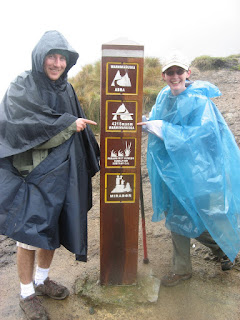Feliz Navidad y un Prospero Ano Nuevo!

Every family has their own unique traditions that often change into adulthood. This Christmas, as the only child of four to come home, I reflected on how our family Christmases have changed.
The holidays began with the hefting of the tree. It would be kept in the garage for a few days (leading my brother to believe as an adult that a tree needs to be kept cold before being brought into the house) until Dad struggled with it up two flights of stairs, scratching ceilings and raining needles over everything. This event was followed closely by the holiday vacuuming. We would decorate the tree with handmade ornaments and metal tinsel which unfortunately conducts electricity very well and eventually migrated from the tree to the carpeting, Christmas sweaters and anything remotely charged within a four foot radius. Then we'd set up the creche and tie our stockings on the entertainment center; the fireplace is downstairs and lacks a mantel anyway.
On Christmas morning we would run and perch in the living room. We never disturbed the inner sanctum of the parents' bedroom but adopted my father's own technique for rallying the troops - yelling - until we were allowed to open the stockings which held a treasure trove of lego sets, chocolates, and Christmas socks.
After the small taste of gift-wrapping we would all go to church where we would smoosh into the pews while trying to avoid actually touching each other. Afterwards, while still attired in relatively clean and unwrinkled clothing we were subjected to the annual family photo. This involved one sibling or another pinching or goosing another while our mother yelled "Not that smile! Your real smile!" as we grimaced to avoid flinching. After many years this joyous tradition became known affectionately (or less-so) as the "Christmas torture."
A big breakfast followed, with us kids eating as fast as humanly possible so that we could return to the living room. (Semi-annually my brother would be sick and miserable - which added an extra dimension to the festivities.) My parents, on the other hand, moved astoundingly slow, chewing more than absolutely necessary and insisting on coffee and a bathroom break as we yelled with increasing volume from the couch.
My mother gave out the presents, one to each person, and we would all open them at the same time. Santa was always generous and even included my parents who by the way had markedly different handwriting; I never figured this out. My best gift ever was new ice skates and as the youngest girl it was the only new pair of ice skates I ever got. When gift guessing/shaking one person always speculated that it was either a tennis racket or a hockey stick. To save money, or trees, my mother always reused boxes. You could always count on the Deb box making an appearance and our personal favorite, the cat box. The cat box, still in use today, is a green box that has a picture of two kittens gamboling with a Christmas wreath. In the spirit of sibling rivalry we declared that the recipient of the cat box was Mom's favorite for the year.
Christmas continued at dinner with the presence of Gram, Uncle John and Aunt Ruth, Joe and Mr. Pfister. Mr Pfister deserves his very own paragraph honestly. He was an ancient German man (I'm pretty sure this wasn't just my youthful perspective) who was so spry that he would always swing up the stairs on the banister. He had a dog named Wicket, equally ancient yet spry, who could jump at least ten feet in the air. Wicket was only allowed on the stair landing which I was perfectly fine with as he was a completely insane animal.
The Christmas spirit hasn't changed overly. The stocking gifts evolved into chapsticks and socks. The celebration just wouldn't be the same without the annual gift of lip balm! Breakfast is my favorite part as it is very rare that my entire family eats together. (My father has a slurping fondness for oatmeal that requires us kids to construct cereal box barriers to avoid seeing the gray mass in his bowl). The tree is fake. Some relatives are gone (including Wicket) and new ones introduced. My brother-in-law insists on putting hot sauce on the turkey. And this year I was declared the favorite!
Merry Christmas!
















 Shimon went back to La Paz and the states Saturday night and due to a lack of buses leaving directly for Tarija, I left for Potosí on Sunday afternoon. Unfortunately I missed my connecting bus and due to an overwhelming urge to sleep in my own bed and see my kitten I paid an arm and a leg to take a very bumpy 4hour taxi ride home.
Shimon went back to La Paz and the states Saturday night and due to a lack of buses leaving directly for Tarija, I left for Potosí on Sunday afternoon. Unfortunately I missed my connecting bus and due to an overwhelming urge to sleep in my own bed and see my kitten I paid an arm and a leg to take a very bumpy 4hour taxi ride home.
